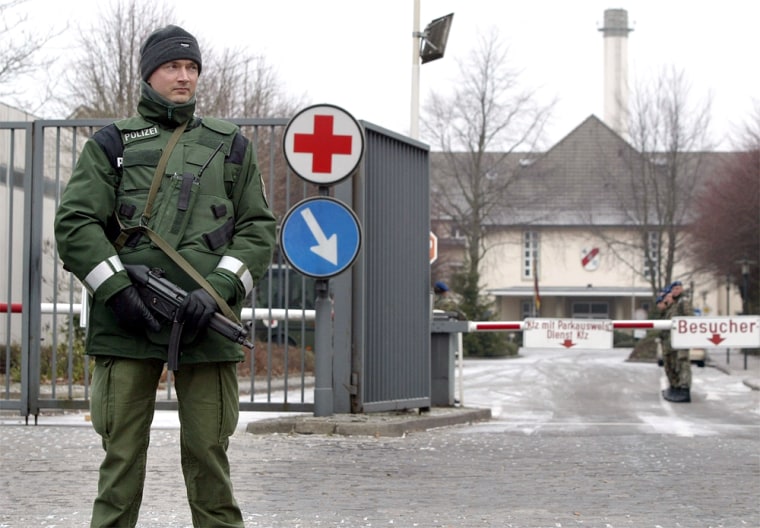While Americans may complain about the color-coded terror alerts issued periodically by the Bush administration, they are the epitome of clarity in comparison with the situation in Germany.
Instead of colored alerts, security officials say Germany faces "an abstractly high danger" — a confusing categorization which often leaves the public, and many of the country’s institutions, clueless.
A security scramble around the New Year's holiday -- a period of high alerts across the United States as well as Western Europe -- underscored the randomness of the system.
On Dec. 30, a state official in Hamburg dispatched a special operations squad — dozens of policemen with large armored vehicles and huge roadblock containers -- to a military hospital.
It followed warnings about a possible terror attack on "a military installation in Europe," which had been passed from the CIA to German intelligence agencies.
Government officials said Hamburg's Dirk Nockemann had reacted quickly. Too quickly, as it turned out.
The prompt anti-terror measures were not what the federal government officials had expected. Shortly after the security forces had positioned themselves around the hospital, Interior Minister Otto Schily criticized Nockemann's order and he later received an official reprimand.
Schily argued that the local Hamburg official had given away secret information in his response to the threat and had failed to confer with federal authorities. But Nockeman insisted he only was doing his job.
Lack of centralized coordination
Germany, like many other European states, is not organized centrally, but federally.
Each of the 16 states hosts its own police agency, which in turn reports crucial information on terrorism to Germany's federal police — the BKA.
Information from undercover agents is dealt with separately and often not shared with all institutions.
"State police agencies currently find themselves in a troublesome situation," ZDF (German television) terrorism expert Elmar Thevessen told NBC News. "They simply do not have the financial means to put all desirable measures into action."
On a national level, Germany's three intelligence agencies, along with the federal police and the general prosecutor’s office, are responsible for terrorism issues.
"But, in spite of working side by side, one authority often claims more power than the other," a state intelligence official said. The splitting of responsibilities can widespread massive confusion when it comes to monitoring and assessing security threats.
The problem is that foreign countries have difficulties in deciding on whom to give information to in Germany," Klaus Jansen of the Criminal Detectives Association told German television ARD. "The fact that various state institutions receive information at the same time, but eventually come up with different evaluations, is often disastrous — that is our main problem," Jansen said.
Increased security measures
The German Interior Ministry has committed a considerable amount of money to improving security measures — $259 million in 2002 and $355 million in 2003. American and Jewish institutions have had constant protection as they are considered to be the most likely targets for terrorist attacks.
This year, German ship owners will spend an estimated $70.5 million in order to meet security regulations. Airlines, such as Lufthansa, require their personnel to complete special security training. The installation of strengthened cockpit doors has already cost Lufthansa $42 million.
Not all of these security measures have been welcomed with open arms. In Berlin, local citizens have openly criticized the extent of the tight security. An entire street block in the city center has been sealed off to protect the U.S. Embassy. Security measures around the British embassy interfere with the inner-city traffic flow.
The new American security directives have put increasing pressure on European airlines. Though the official number of sky marshals protecting German passenger airplanes is not publicized, special units from the Federal Border Guard have been called to duty for this purpose.
"We have to comply with the requirements," a Lufthansa spokesman told NBC, "American authorities do not directly address German airlines, but they direct their demands to German authorities, who then have to make sure that these requirements are put into action."
At the same time, American intelligence services and security authorities have stepped up international cooperation. But many officials, like Bavarian Interior Minister Guenther Beckstein, believe that the information Germany receives from American secret services is often "filtered."
In turn, the Federal Police Agency struggles with a flood of information coming from intelligence services and alert German citizens alike.
Between Sept. 11, 2001, and Sept. 11, 2003, Germany's federal police registered 25,430 alerts.
And while there's no concrete evidence of terrorism threats in Germay, analysts say it's imperative that federal and state authorities work out the kinks in their security system so they can adequately detect and respond to any threats in the future.
